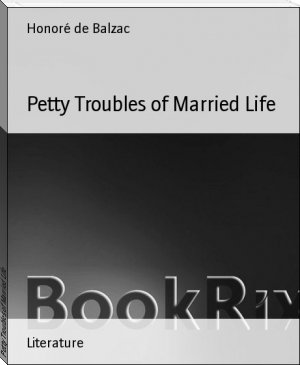Petty Troubles of Married Life by Honoré de Balzac (general ebook reader TXT) 📖

- Author: Honoré de Balzac
Book online «Petty Troubles of Married Life by Honoré de Balzac (general ebook reader TXT) 📖». Author Honoré de Balzac
Caroline tells her friends things which she thinks exceedingly flattering, but which cause a sagacious husband to make a wry face.
"Adolphe has been delightful for some time past. I don't know what I have done to deserve so much attention, but he overpowers me. He gives value to everything by those delicate ways which have such an effect upon us women. After taking me Monday to the _Rocher de Cancale_ to dine, he declared that Very was as good a cook as Borrel, and he gave me the little party of pleasure that I told you of all over again, presenting me at dessert with a ticket for the opera. They sang 'William Tell,' which, you know, is my craze."
"You are lucky indeed," returns Madame Deschars with evident jealousy.
"Still, a wife who discharges all her duties, deserves such luck, it seems to me."
When this terrible sentiment falls from the lips of a married woman, it is clear that she _does her duty_, after the manner of school-boys, for the reward she expects. At school, a prize is the object: in marriage, a shawl or a piece of jewelry. No more love, then!
"As for me,"--Madame Deschars is piqued--"I am reasonable. Deschars committed such follies once, but I put a stop to it. You see, my dear, we have two children, and I confess that one or two hundred francs are quite a consideration for me, as the mother of a family."
"Dear me, madame," says Madame de Fischtaminel, "it's better that our husbands should have cosy little times with us than with--"
"Deschars!--" suddenly puts in Madame Deschars, as she gets up and says good-bye.
The individual known as Deschars (a man nullified by his wife) does not hear the end of the sentence, by which he might have learned that a man may spend his money with other women.
Caroline, flattered in every one of her vanities, abandons herself to the pleasures of pride and high living, two delicious capital sins. Adolphe is gaining ground again, but alas! (this reflection is worth a whole sermon in Lent) sin, like all pleasure, contains a spur. Vice is like an Autocrat, and let a single harsh fold in a rose-leaf irritate it, it forgets a thousand charming bygone flatteries. With Vice a man's course must always be crescendo!--and forever.
Axiom.--Vice, Courtiers, Misfortune and Love, care only for the PRESENT.
At the end of a period of time difficult to determine, Caroline looks in the glass, at dessert, and notices two or three pimples blooming upon her cheeks, and upon the sides, lately so pure, of her nose. She is out of humor at the theatre, and you do not know why, you, so proudly striking an attitude in your cravat, you, displaying your figure to the best advantage, as a complacent man should.
A few days after, the dressmaker arrives. She tries on a gown, she exerts all her strength, but cannot make the hooks and eyes meet. The waiting maid is called. After a two horse-power pull, a regular thirteenth labor of Hercules, a hiatus of two inches manifests itself. The inexorable dressmaker cannot conceal from Caroline the fact that her form is altered. Caroline, the aerial Caroline, threatens to become like Madame Deschars. In vulgar language, she is getting stout. The maid leaves her in a state of consternation.
"What! am I to have, like that fat Madame Deschars, cascades of flesh a la Rubens! That Adolphe is an awful scoundrel. Oh, I see, he wants to make me an old mother Gigogne, and destroy my powers of fascination!"
Thenceforward Caroline is willing to go to the opera, she accepts two seats in a box, but she considers it very distingue to eat sparingly, and declines the dainty dinners of her husband.
"My dear," she says, "a well-bred woman should not go often to these places; you may go once for a joke; but as for making a habitual thing of it--fie, for shame!"
Borrel and Very, those masters of the art, lose a thousand francs a day by not having a private entrance for carriages. If a coach could glide under an archway, and go out by another door, after leaving its fair occupants on the threshold of an elegant staircase, how many of them would bring the landlord fine, rich, solid old fellows for customers!
Axiom.--Vanity is the death of good living.
Caroline very soon gets tired of the theatre, and the devil alone can tell the cause of her disgust. Pray excuse Adolphe! A husband is not the devil.
Fully one-third of the women of Paris are bored by the theatre. Many of them are tired to death of music, and go to the opera for the singers merely, or rather to notice the difference between them in point of execution. What supports the theatre is this: the women are a spectacle before and after the play. Vanity alone will pay the exorbitant price of forty francs for three hours of questionable pleasure, in a bad atmosphere and at great expense, without counting the colds caught in going out. But to exhibit themselves, to see and be seen, to be the observed of five hundred observers! What a glorious mouthful! as Rabelais would say.
To obtain this precious harvest, garnered by self-love, a woman must be looked at. Now a woman with her husband is very little looked at. Caroline is chagrined to see the audience entirely taken up with women who are _not_ with their husbands, with eccentric women, in short. Now, as the very slight return she gets from her efforts, her dresses, and her attitudes, does not compensate, in her eyes, for her fatigue, her display and her weariness, it is very soon the same with the theatre as it was with the good cheer; high living made her fat, the theatre is making her yellow.
Here Adolphe--or any other man in Adolphe's place--resembles a certain Languedocian peasant who suffered agonies from an agacin, or, in French, corn,--but the term in Lanquedoc is so much prettier, don't you think so? This peasant drove his foot at each step two inches into the sharpest stones along the roadside, saying to the agacin, "Devil take you! Make me suffer again, will you?"
"Upon my word," says Adolphe, profoundly disappointed, the day when he receives from his wife a refusal, "I should like very much to know what would please you!"
Caroline looks loftily down upon her husband, and says, after a pause worthy of an actress, "I am neither a Strasburg goose nor a giraffe!"
"'Tis true, I might lay out four thousand francs a month to better effect," returns Adolphe.
"What do you mean?"
"With the quarter of that sum, presented to estimable burglars, youthful jail-birds and honorable criminals, I might become somebody, a Man in the Blue Cloak on a small scale; and then a young woman is proud of her husband," Adolphe replies.
This answer is the grave of love, and Caroline takes it in very bad part. An explanation follows. This must be classed among the thousand pleasantries of the following chapter, the title of which ought to make lovers smile as well as husbands. If there are yellow rays of light, why should there not be whole days of this extremely matrimonial color?
FORCED SMILES.
On your arrival in this latitude, you enjoy numerous little scenes, which, in the grand opera of marriage, represent the intermezzos, and of which the following is a type:
You are one evening alone after dinner, and you have been so often alone already that you feel a desire to say sharp little things to each other, like this, for instance:
"Take care, Caroline," says Adolphe, who has not forgotten his many vain efforts to please her. "I think your nose has the impertinence to redden at home quite well as at the restaurant."
"This is not one of your amiable days!"
General Rule.--No man has ever yet discovered the way to give friendly advice to any woman, not even to his own wife.
"Perhaps it's because you are laced too tight. Women make themselves sick that way."
The moment a man utters these words to a woman, no matter whom, that woman,--who knows that stays will bend,--seizes her corset by the lower end, and bends it out, saying, with Caroline:
"Look, you can get your hand in! I never lace tight."
"Then it must be your stomach."
"What has the stomach got to do with the nose?"
"The stomach is a centre which communicates with all the organs."
"So the nose is an organ, is it?"
"Yes."
"Your organ is doing you a poor service at this moment." She raises her eyes and shrugs her shoulders. "Come, Adolphe, what have I done?"
"Nothing. I'm only joking, and I am unfortunate enough not to please you," returns Adolphe, smiling.
"My misfortune is being your wife! Oh, why am I not somebody else's!"
"That's what _I_ say!"
"If I were, and if I had the innocence to say to you, like a coquette who wishes to know how far she has got with a man, 'the redness of my nose really gives me anxiety,' you would look at me in the glass with all the affectations of an ape, and would reply, 'O madame, you do yourself an injustice; in the first place, nobody sees it: besides, it harmonizes with your complexion; then again we are all so after dinner!' and from this you would go on to flatter me. Do I ever tell you that you are growing fat, that you are getting the color of a stone-cutter, and that I prefer thin and pale men?"
They say in London, "Don't touch the axe!" In France we ought to say, "Don't touch a woman's nose."
"And all this about a little extra natural vermilion!" exclaims Adolphe. "Complain about it to Providence, whose office it is to put a little more color in one place than another, not to me, who loves you, who desires you to be perfect, and who merely says to you, take care!"
"You love me too much, then, for you've been trying, for some time past, to find disagreeable things to say to me. You want to run me down under the pretext of making me perfect--people said I _was_ perfect, five years ago."
"I think you are better than perfect, you are stunning!"
"With too much vermilion?"
Adolphe, who sees the atmosphere of the north pole upon his wife's face, sits down upon a chair by her side. Caroline, unable decently to go away, gives her gown a sort of flip on one side, as if to produce a separation. This motion is performed by some women with a provoking impertinence: but it has two significations; it is, as whist players would say, either a signal _for trumps_ or a _renounce_. At this time, Caroline renounces.
"What is the matter?" says Adolphe.
"Will you have a glass of sugar and water?" asks Caroline, busying herself about your health, and assuming the part of a servant.
"What for?"
"You are not amiable while digesting, you must be in pain. Perhaps you would like a drop of brandy in
 Have you ever thought about what fiction is? Probably, such a question may seem surprising: and so everything is clear. Every person throughout his life has to repeatedly create the works he needs for specific purposes - statements, autobiographies, dictations - using not gypsum or clay, not musical notes, not paints, but just a word. At the same time, almost every person will be very surprised if he is told that he thereby created a work of fiction, which is very different from visual art, music and sculpture making. However, everyone understands that a student's essay or dictation is fundamentally different from novels, short stories, news that are created by professional writers. In the works of professionals there is the most important difference - excogitation. But, oddly enough, in a school literature course, you don’t realize the full power of fiction. So using our website in your free time discover fiction for yourself.
Have you ever thought about what fiction is? Probably, such a question may seem surprising: and so everything is clear. Every person throughout his life has to repeatedly create the works he needs for specific purposes - statements, autobiographies, dictations - using not gypsum or clay, not musical notes, not paints, but just a word. At the same time, almost every person will be very surprised if he is told that he thereby created a work of fiction, which is very different from visual art, music and sculpture making. However, everyone understands that a student's essay or dictation is fundamentally different from novels, short stories, news that are created by professional writers. In the works of professionals there is the most important difference - excogitation. But, oddly enough, in a school literature course, you don’t realize the full power of fiction. So using our website in your free time discover fiction for yourself. 




Comments (0)